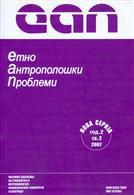Legende o krađi organa: moralna dilema savremenog društva
Legends of Organ Theft: The Moral Dilemma of Contemporary Society
Author(s): Dragana AntonijevićSubject(s): Anthropology, Recent History (1900 till today), Health and medicine and law
Published by: Филозофски факултет, Универзитет у Београду
Keywords: urban legend; kidney theft; moral dilemma; organ donation; semantic analysis; legend transformation scheme;
Summary/Abstract: Legends and rumors of organ theft became a global phenomenon in the beginning of the 80s, with the information originating from the "Third world" countries. Victims where poor and powerless, typically children. The rumor engaged a series of actions from anthropologists, NGO’s and media trying to ascertain their validity. Before long, the world was divided into two camps: on the one hand where those who believed the rumors, condemning the West for its exploitation of the underdeveloped and the poor that lead to organ theft from healthy individuals, to satisfy the needs of the rich white patients; and the other faction that, through the data, tried to negate these assertions as unfounded and illogical. At the beginning of the 90s, similar reports surfaced in the highly developed societies of Europe and the USA. Unlike the rumors, these where developed, structured narratives with specific content – legends of kidney theft, whose victims were left alive. Internet has brought about the expansion of such stories. None the less, they remained the under-analyzed, not attracting the attention of the politically minded and militant anthropologists who, in the Third world rumors, recognized material for their anti-colonial and mediatory theories. Few have tried to explain the legend and folklore origins of the First world narratives and to ascertain their function without insightful analysis. That is why I engaged in a semantic analysis of the legend in the context of the highly developed societies, with the intent of exposing their message of a deep moral dilemma concerning organ donation. I found that their hidden meaning is "revolutionary", not an inversion that I thought previously, but in accordance with the public discourse that encourages voluntary and legal donations, from cadaver as from living donors, wich is real disadaptive problem for those societies. I proposed such a meaning by analysing the most unusual and astonishing element in the story. On the other side, the legendrumors of Third and Second World, in my view, sent an opposite message, showing the reverse side of the transplantation issue, medical progress and a deeper, existential dilemma of life and death, sickness and health, exposing the doubts intertwined with organ transplantation. Interestingly the legends of organ theft that appeared in Serbia during 2007 had more in common with the legends of the Third world, than with the narratives of the developed societies. In the essay, the interposition of the legends from Serbia, that were instigated by the transitional nature of its socioeconomic reality, are elaborated. That has inspired me to put forward a scheme of narrative, geographical and social transformation of the organ theft legends, thus showing their development intertwined with motifs and spatial markers disperses a system of performances around the world.
Journal: Етноантрополошки проблеми
- Issue Year: 2/2007
- Issue No: 2
- Page Range: 35-69
- Page Count: 35
- Language: Serbian

